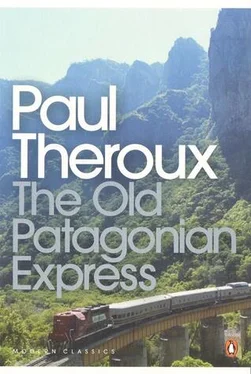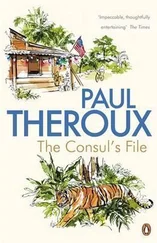Paul Theroux - The Old Patagonian Express - By Train Through the Americas
Здесь есть возможность читать онлайн «Paul Theroux - The Old Patagonian Express - By Train Through the Americas» весь текст электронной книги совершенно бесплатно (целиком полную версию без сокращений). В некоторых случаях можно слушать аудио, скачать через торрент в формате fb2 и присутствует краткое содержание. Год выпуска: 2008, Издательство: Penguin Books Ltd, Жанр: Путешествия и география, на английском языке. Описание произведения, (предисловие) а так же отзывы посетителей доступны на портале библиотеки ЛибКат.
- Название:The Old Patagonian Express: By Train Through the Americas
- Автор:
- Издательство:Penguin Books Ltd
- Жанр:
- Год:2008
- ISBN:нет данных
- Рейтинг книги:5 / 5. Голосов: 1
-
Избранное:Добавить в избранное
- Отзывы:
-
Ваша оценка:
- 100
- 1
- 2
- 3
- 4
- 5
The Old Patagonian Express: By Train Through the Americas: краткое содержание, описание и аннотация
Предлагаем к чтению аннотацию, описание, краткое содержание или предисловие (зависит от того, что написал сам автор книги «The Old Patagonian Express: By Train Through the Americas»). Если вы не нашли необходимую информацию о книге — напишите в комментариях, мы постараемся отыскать её.
The Old Patagonian Express: By Train Through the Americas — читать онлайн бесплатно полную книгу (весь текст) целиком
Ниже представлен текст книги, разбитый по страницам. Система сохранения места последней прочитанной страницы, позволяет с удобством читать онлайн бесплатно книгу «The Old Patagonian Express: By Train Through the Americas», без необходимости каждый раз заново искать на чём Вы остановились. Поставьте закладку, и сможете в любой момент перейти на страницу, на которой закончили чтение.
Интервал:
Закладка:
I had been using the hamlet of Leleque on my map as a landmark. But Leleque was still hours away. The train toiled, seldom running straight, occasionally stopping — a shout, the bell, the whistle, the bark, and then we were off again. I realized that my trip was ending, but I was not sad when I remembered that, in a few hours, at nightfall perhaps, the train would bring me to my destination and there would be nothing more. My mind raced ahead to the station at Esquel, the plane to Buenos Aires, to my arrival home. Yes, I would take a taxi at the airport — hang the expense. My destination was near; I was impatient.
But this landscape taught patience, caution, tenacity. It needed to be studied to be seen. A glimpse of it told nothing. Down the narrowness of the tracks beside the desert the labouring engine chugged, always seeming on the verge of spewing its guts out, exploding in a shower of metal and vapor, or else seizing up in a succession of glugs and stopping on a slope, rolling backwards into the dip, and going no more. It seemed a marvel that an old engine like this could keep going, and I came to see the gasps of the locomotive as energetic rather than feeble.
But there was not enough in the engine or the landscape to hold the attention. I concentrated on Boswell and ate grapes and dozed. The sun had dropped; the hills were higher to the west and the sun slid towards them. The wind was colder. I saw that there was no chance of our arriving at Esquel before dark. When darkness fell it did so in that sudden Patagonian way, as swiftly as a dropped curtain, filling the night with chill. In the desert silence was the sound of wind, and the fretting train. The train stopped at the smaller stations near Esquel; the locomotive trembled in the darkness, and beyond it the sky was an immense sieve of blue stars.
It was after eight o'clock when I saw the lights. I looked for more. There were no more. There was nothing to these places, I thought, until you were on top of them. I did not know at that moment that we were on top of Esquel. I had expected more — an oasis, perhaps taller poplars, the sight of a few friendly bars, a crowded restaurant, a floodlit church, anything to signify my arrival. Or less: like one of the tiny stations along the line; like Jacobacci, a few sheds, a few dogs, a bell. The train emptied quickly.
I found a man with an official-looking cap, and a railway badge pinned to his shirt. Was there a hotel nearby?
'Esquel is full of hotels,' he said. 'Some of them are good, too.'
I asked him to name one. He did. I took myself to it and had — but not out of choice- a cold bath. And then to the restaurant.
'What will you drink? Red wine?'
'Yes,'I said.
'And what will you eat? Steak?'
'Yes.'
The usual. But the atmosphere was different here, a kind of Wild West saloon feeling, people in town for the weekend, leathery faces, wearing their leather jackets indoors here, one man with his book propped on a chair-seat. Waiters hurried by with trays. I saw a clock, a calendar, a photograph of what was probably a local football team, a saint's portrait.
I had been planning to go for a walk, to look for a bar. My muscles ached from the ride and I wanted to stretch. But there, in that chair, I started to doze. I shook myself awake and called for the bill.
The sand and grit between the pages of Boswell tumbled onto my chest as I lay in bed. I read a sentence, watched the sand slide out and in the act of brushing it away fell asleep.
It had been my intention to arrive in Esquel on Holy Saturday and to wake on Easter Sunday and watch the sunrise. But Easter had passed. This was no special date, and I had overslept. I got up and went outside. It was a sunny breezy day — the sort of weather that occurs every day of the year in that part of Patagonia.
I walked to the station. The engine that had taken me to Esquel looked derelict on the siding, as if it would never run again. But it had a hundred more years in it, I was sure. I walked beyond it, past the one-story houses to the one-roomed huts, to where the road turned into a dusty track. There was a rocky slope, some sheep, the rest bushes and weeds. If you looked closely you could see small pink and yellow flowers on these bushes. The wind stirred them. I went closer. They shook. But they were pretty. Behind my head was a great desert.
The Patagonian paradox was this: to be here, it helped to be a miniaturist, or else interested in enormous empty spaces. There was no intermediate zone of study. Either the enormity of the desert space, or the sight of a tiny flower. You had to choose between the tiny or the vast.
The paradox diverted me. My arrival did not matter. It was the journey that counted. And I would follow Johnson's advice. Early in his career he had translated the book of a Portuguese traveller in Abyssinia. In his Preface, Johnson wrote, 'He has amused the reader with no romantick absurdity, or incredible fictions; whatever he relates, 'whether true or not, is at least probable, and he who tells nothing exceeding the bounds of probability, has a right to demand that they should believe him who cannot contradict him.'
The sheep saw me. The younger ones kicked their heels. When I looked again, they were gone, and I was an ant on a foreign anthill. It was impossible to verify the size of anything in this space. There was no path through the bushes, but I could look over them, over this ocean of thorns which looked so mild at a distance, so cruel nearby, so like misshapen nosegays close-up. It was perfectly quiet and odourless.
I knew I was nowhere, but the most surprising thing of all was that I was still in the world after all this time, on a dot at the lower part of the map. The landscape had a gaunt expression, but I could not deny that it had readable features and that I existed in it. This was a discovery — the look of it. I thought: Nowhere is a place.
Down there the Patagonian valley deepened to grey rock, wearing its eons' stripes and split by floods. Ahead, there was a succession of hills, whittled and fissured by the wind, which now sang in the bushes. The bushes shook with this song. They stiffened again and were silent. The sky was clear blue. A puff of cloud, white as a quinceflower, carried a small shadow from town, or from the South Pole. I saw it approach. It rippled across the bushes and passed over me, a brief chill, and then went rucking east. There were no voices here. There was this, what I saw; and, though beyond it were mountains and glaciers and albatrosses and Indians, there was nothing here to speak of, nothing to delay me further. Only the Patagonian paradox: the vast space, the very tiny blossoms of the sage-brush's cousin. The nothingness itself, a beginning for some intrepid traveller, was an ending for me. I had arrived in Patagonia, and I laughed when I remembered I had come here from Boston, on the subway train that people took to work.
Интервал:
Закладка:
Похожие книги на «The Old Patagonian Express: By Train Through the Americas»
Представляем Вашему вниманию похожие книги на «The Old Patagonian Express: By Train Through the Americas» списком для выбора. Мы отобрали схожую по названию и смыслу литературу в надежде предоставить читателям больше вариантов отыскать новые, интересные, ещё непрочитанные произведения.
Обсуждение, отзывы о книге «The Old Patagonian Express: By Train Through the Americas» и просто собственные мнения читателей. Оставьте ваши комментарии, напишите, что Вы думаете о произведении, его смысле или главных героях. Укажите что конкретно понравилось, а что нет, и почему Вы так считаете.












